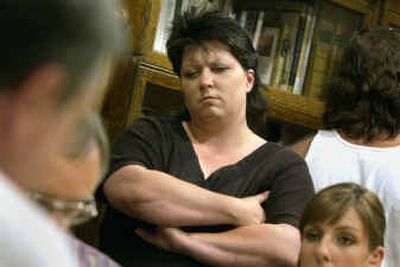West signs bill to outlaw public camping

Pitching a tent on public property soon will be illegal in the city of Spokane. Mayor Jim West signed an ordinance Monday aimed at preventing transients from camping in parks, rights of way or other city-owned property.
“There is a need for this ordinance to protect the citizens of Spokane and the property that they own,” West said before signing the law at a press conference. “When the city owns property for the general public’s use, to move in and take something over … (or) destroy public property is a problem.”
Homeless protesters who this month set up a camp in the median of Riverside Avenue in front of the Spokane Club said they would seek to repeal the ordinance by referendum.
David Bilsland, a leader of that demonstration, said another “camp” likely will be established this week somewhere else in the city. On Monday, Bilsland and others gathered in the mayor’s conference room to attend the signing of the ordinance, then went outside City Hall with flags and signs to protest it.
Among them was Michelle Jensen, who said she has been homeless “on-and-off” for three years, most recently for about four months. She said she was evicted from an apartment for single-parent families when her son went to live with his father. When her car broke down, she lost her job in Post Falls and couldn’t find other work.
“I just want to find something,” said the 35-year-old Jensen, who was among the protesters evicted from the Riverside median and the old Playfair property last week. She thinks the city should set aside property somewhere for the homeless to camp in their tents or sleeping bags.
West said he was asking a committee of advisers to suggest some short-term solutions for providing shelter for the homeless. Asked whether he thought the city should set aside an area for the homeless to occupy with their tents and tarps, the mayor replied: “I’m not going to prejudge the recommendations of the committee.”
Local shelters currently do have space, he added.
“There are more than enough homeless beds to accommodate them,” West said. Last week, when protesters were ordered off the Riverside median, the shelters had more than 100 empty beds, he said.
But Jensen said she had been in several of the local shelters over the last three years, and she had her meager belongings stolen in one of them. She feels safer camping with the other protesters.
“We all want to get something where everyone can be in one place,” she said.
The law against camping on public property doesn’t take effect for 30 days. In the meantime, people can still be arrested for obstructing the public right-of-way, creating a public nuisance or trespassing, West said. Those were the laws the police cited when ordering the protesters to move from previous encampments.
Bilsland said he expected to meet with city attorneys this morning about a referendum that would repeal the transient shelter ordinance at the ballot box.
To get on the ballot, protesters and their supporters would have to gather more than 5,000 signatures from registered city voters. The city charter requires that a referendum have signatures that are equal to 10 percent of the votes in the last city general election, and last November’s ballot featured relatively high turnout from a spirited mayoral contest.
If protesters turn in sufficient signatures, the city would be barred from enforcing the ordinance until the election.